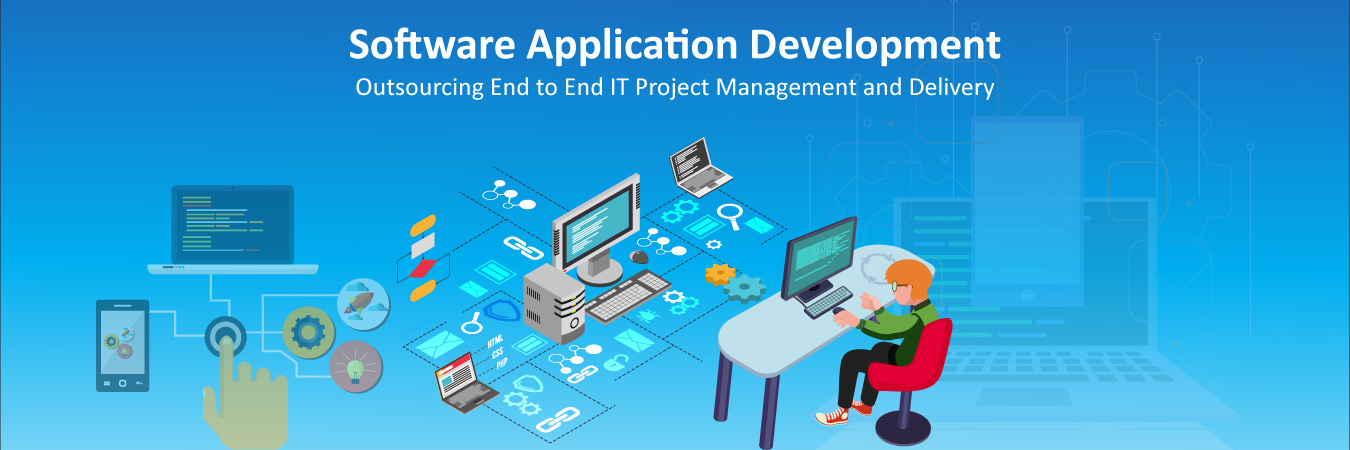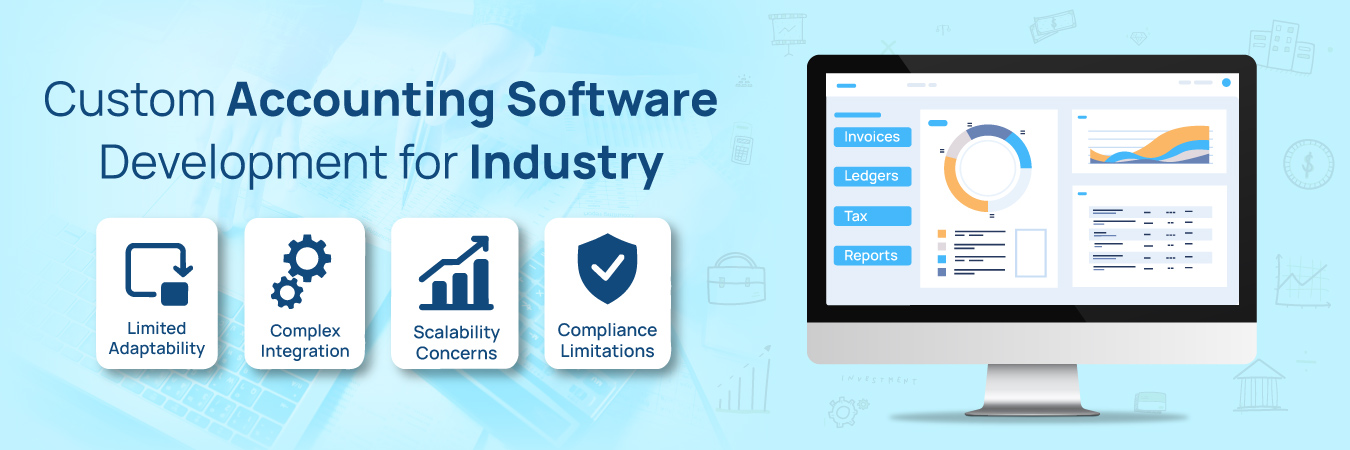
Software Application Development: Outsourcing End to End IT Project Management and Delivery
According to a report, only 2.5% of companies across the globe successfully complete 100% of their projects. So, when it comes to delivering projects successfully, the percentage, as you can see, is very less. It isn’t true that the rest of the lot doesn’t try its best. The only difference is that of an accurate, timely, and focused project management and delivery plan that the rest don’t have.
IT Project Management is a Complex Task!
IT project management and delivery isn’t a straightforward task. Clients are demanding, and everything around is urgent enough to create a hassle. They expect an error-free and incredible product, in-time. Hence, every project in the IT industry, whether large or small, whether critical or regular, involves a range of complex technical, and administrative tasks, and responsibilities.
For instance, if the project is about software application and development, the project involves everything right from developing software architecture, software development to software testing, and maintenance, and an array of other critical tasks. All these phases have their unique challenges, and which is where the term project management (PM) comes in the picture.
Every Project is Important
Every project, regardless of its size, is critical for the service provider. Hence, companies cannot play around and delay a particular project to complete another. Every project is a priority. So, it needs a focused leadership and flexible PM team that ensure end-to-end project administration.
Often companies choose to in-source project management, as they feel it is easier to hire experienced project managers and get their projects going. But, in reality, it isn’t as apparent. Hiring involves cost, time, and efforts across various verticals. Besides, you don’t know how the project manager will fare.
What will you get from this blog?
But then, you don’t have to live with such challenges. Outsourcing IT project management and delivery proves a more feasible alternative that ensures a professional touch to every project and guarantees success. If you’ve got a software development project in the pipeline, and you are unsure about its completion, reading this blog will show you the right direction.
It discusses the benefits of outsourcing software development, and also some guidelines on hiring a remote team to ensure end-to-end project administration, management, and delivery. Besides, it also talks about the significance of IT project management delivery and the challenges that you can encounter while dealing with an in-house software development approach.
Importance of IT Project Management and Delivery
The significance of project management and delivery transcends the objectives and goals of your organization. It extends to your customer’s strategic goals and aspirations. Remember, there’s an objective to complete after every project, about which every client is serious. When clients give you a project, they think of you as a better candidate, and hence expect timely delivery and fulfilment of SLA.
At the end of the day, everything boils down to four factors – Customer satisfaction, completion of the project, your reputation, and credibility on the market. Hence, no matter the size of the project, you must ensure that you manage it well and deliver it on time. So, here are some reasons that define the importance of project management delivery in the IT industry’s context.
1. PM helps you Chalk out a Proper Project Plan
Project planning is the most fundamental aspect of project management. The plan enables you to focus on the direction of the project, divide the project into various phases, plan out resources, delegate tasks, and work towards the completion of the project in an expected way. A proper plan enables your project manager to oversee everything, review the project across phases, and ensure timely completion.
2. PM involves a Project Leader who completes the Project
Your project manager is the leader of your project who owns the project and fulfills every responsibility. He is the one who employs every resource to ensure project delivery in the desired manner. Besides, the project leader also provides accountability across every element of the project. He binds the team to ensure coordination and harmony throughout all the phases of the assignment.
3. PM Controls Project Cost and Product Quality
PMI in 2018 stated that 9.9% of every dollar invested in a particular project got wasted on account o poor or haphazard project management. In such a situation, an investment of 100 USD in a project indicates the wastage of around 9.9 USD.
In this view, project management puts forth a set of standards that every team member must follow. Without these rules and regulations, the project is likely to drift and end up nowhere. But, with them on your side, your leader exercises better control over the project and its progress.
The leader of the project, as a part of supervision, also monitors the cost aspect. He also ensures that nowhere does the team, in the wake of timely completion, and cost control, compromise on delivering the expected levels of quality of the product.
The project leader strikes a balance between the project cost, without letting the budget blow out of proportion, and at the same time, ensures excellent product quality through strict quality checks, and testing procedures. All of it is possible only when the project is managed well, and across every part.
4. PM Organizes the Project’s Process
IT projects that comprise various phases, are a set of processes that demand organization to ensure proper completion. Project management helps you organize the project and define its process to take it towards successful completion. It scripts the entire project so that the project progresses as planned, and doesn’t suffer due to any sorts of challenges.
Besides, it also helps the project manager to keep the processes flexible enough to address problems during the project, and maintain transparency across the entire team, and with clients.
In-House Software Development Challenges- Resource, Time and Cost Management
Software development and management are a specialized set of operations. Often, companies choose to develop an in-house software development team to ensure a customized software product for their business. Another thought that drives the decision is having an in-house software support team that facilitates efficient and prompt technical support, along with customized solutions to the users.
But, the picture isn’t always as promising and sweet as it may seem. In-house software development involves several challenges, overcoming, which may drain the company’s energy. Of course, having an exclusive in-house software team isn’t as disadvantageous. But then, what matters here is business prudence and exigencies. So, take a look at the in-house software development challenges.
1. High Investment
Developing software in-house isn’t a cakewalk. The most significant factor, or you may say, challenge is the high investment that in-sourced software development demands. On the one hand, wherein you have to onboard the necessary technology, on the other, you need to recruit expert and experienced software developers. Further, the resources require training, and which incurs both time as well as cost.
If software isn’t your core business, in-house software development constitutes an expansion of the business. It demands a considerable capital investment, and that is the most challenging part.
2. Recruitment of Resources
Recruiting isn’t apparent and straightforward as it may seem. You and your team already have a lot on the agenda. Entering a new territory and hiring an entirely new set of resources may overwhelm the entire system, and take a toll on your business.
Recruitment involves either delegating the task to your in-house HR team or outsourcing it to a recruitment partner. Both these tasks have their challenge, and they involve time as well as a lot of money. Besides, recruitment consists of a lot of activities, right from floating the requirement, searching for the best resources, screening, short-listing, interviewing, on-boarding, and training them.
You never know how long the process will take to complete and what impact will it have on the project. And, if that’s not enough, dealing with employee administration refers to another set of challenges.
3. Limited Expertise and Experience
An in-house approach often restricts your access to expertise and experience. At times, the problems are too difficult for the in-house team to overcome them. Such situations bring the project to a halt or slow down the development process. They leave you with no option but to hire an external team to rescue your project from the situation.
4. Getting the Right Tools and Technologies Onboard
Software development demands a range of licensed tools and technologies. When you in-source software development, you have to ensure you get the technical infrastructure you need and ensure compliance to avoid legal complications. The process is time-consuming, and attracts a hefty fee, all of which have to be borne by you!
5. Maintenance Expenses
You may overcome every challenge and set up an excellent software development team on your premise. But then, what happens after the project gets over? What do you do with the resources you’ve hired? If you’ve got another project lined up, great! But, what if you don’t, or what if the following projects aren’t as substantial?
The only option you have in such a case is to layoff the existing resources. But, that reflects poorly on your company. Perhaps, it indicates mismanagement and may put your credibility at stake in the employment market. But, if you don’t want that happen, you’ve got to maintain the staff. Again, that involves a lot of extra costs. In other words, you end up in a soup, where you either save money or reputation!
So, what is the solution here? Let us take a look at it.
8 Benefits of Outsourcing Software Development
Outsourcing is a prudent business decision that brings several benefits to the table, especially in the case of software development and management. Let us glance through eight benefits of outsourcing software development.
1. Cost-Effective
Experienced software developers demand higher salaries, the management of which remains with you when you decide to in-source everything. But, when you outsource the project, you don’t have to recruit resources, pay a fee to the recruitment agency, live with employee administration costs, and the hassles of dealing with employee benefits, etc.
The onus, in this case, is with the software development outsourcing company. All you have to do is pay the developer the required fee, and oversee the project at regular intervals to ensure timely completion. Outsourced software developers come at a comparatively lower cost than the full-time ones.
2. Time-Saving
Recruiting, onboarding, licensing, etc. are all time-consuming tasks. Your project, especially when it is tight on the timelines, may go for a toss if you keep struggling with these initial tasks, and don’t get over with them in time. Outsourcing saves a lot of time, as the provider will have a pool of resources ready and can deploy them for your project in a shorter time. It allows you to begin the project on time.
3. Access to Higher Expertise and Experience
With outsourcing, you don’t have to live with limited expertise and experience. The software development outsourcing company ensures that you get the appropriate people, and technology to ensure a seamless software development and management process. Besides, the company takes care of the technological infrastructure you require to develop the software product.
4. Flexibility of Operations
You can decide the operational schedule, depending on how close the deadline is. The external team works round the clock based on your demands and offers a larger degree of flexibility as compared to your in-house team, which may not necessarily work during the night hours.
5. Relief from Routine Operational Hassles
Software development is an intricate process. These intricacies may impede daily business if you are not from the software background, or know little about overcoming the routine operational struggles. Outsourcing, with its fundamental ideology of relieving business owners from the routine operational hassles of a particular process, creates a higher bandwidth, allowing you to focus on your core business.
6. Reduced Time to Market
Clients don’t wait. The world doesn’t wait either! In such a fast-paced and dynamic business environment, the lesser your go-to-market time, the more successful your project. Outsourcing, with the expertise, experience, speed, and techno-strategic capabilities that it brings on board, expedites the software development speed and reduces your time to market to a considerable extent.
7. Abreast of the Latest Technological Development
Software development, for the outsourcing company, is its bread and butter. Hence, the company and its resources stay abreast of all the latest technological developments across the software horizon. These factors help you during the software development project when it comes to software efficiency, quality, and competitive value.
8. Remote Working
While in-house resources occupy space and office infrastructure, a remote software development team works from its location and connects with your company through the internet. It saves space, and time spent in arranging logistics.
5 Tips for Hiring Remote Software Development Team to Handle In-Time Project Delivery and Support
So, now that you know outsourcing software development is a better alternative as compared to in-house software development, here are five tips that will help you choose a competitive software development company for your project.
1. Gauge the Company’s Technical Expertise and Technology Stack
Make sure that you examine the company’s technical expertise and ensure that the team is abreast of all the latest development in the software development stream. Ask them the right questions about the software you want to develop and evaluate the competence of its resources.
Also, ensure that you vet the company’s proficiency on various technology stacks. For instance, if you look forward to having Angular JS or React on the front end, you need developers accordingly. The same goes for other technology stacks. A company proficient at multiple stacks and proven experience in all of them must form your choice.
2. The Employee Strength, Business Volume Handled, along with the Company’s Outsourcing Process
Often, companies ignore this part. They only want to develop a software product. That isn’t the right approach, though. Remember, you aren’t looking for developers, but software development partners.
So, you must also check out other factors, such as employee strength. Knowing the employee strength will help you understand whether the provider is capable of handling a more extensive work volume, and prove useful when it comes to scaling up the team strength when required.
Besides, also check the business volume the software development company handles and its current bandwidth. A lot of outsourced software development companies, to win the project, make tall promises, and later cite workload as an excuse for delays. To ensure it doesn’t happen in your case, make sure that the vendor is capable of handling a higher workload and projects of your size.
An organized process, competitive methodology, and development stages, along with project management capabilities, will help you finish the project on time. Don’t forget it is you who’s going to face the client, and not the software development company. So, ensure that you understand the company’s outsourcing process, and customize it according to the project demands.
3. Software Customization Capabilities
It is your software, and perhaps, it is you, or your client who’s going to use it. So, you know what kind of customization you require. Before you sign the deal, or handover the project details, ensure that you explore the scope of customization with the software development team, and how much of it would they be able to handle. In other words, check out the company’s software customization capabilities.
4. Client Feedback
Make it a point to speak to the software development company’s existing clients, and past clients. Their feedback proves instrumental in helping you make a choice. Besides, it also prepares you for problems that may arise in the future, and seek a clarification to devise a solution for it in the initial stages.
5. Software Development Package
A comprehensive software development package is all you need to ensure end-to-end project management and delivery. So, when you sit to negotiate, make sure you ask about the inclusions of the software development package – whether it includes product tests, or will it only involve software development and nothing else.
Also, make sure you know whether the company will be able to ensure end-to-end project management and delivery, or will it require handholding from your company as well. Understanding other factors such as the invoicing process, administrative expenses, remote working fees, etc. also play a pivotal role in choosing the right company.
Fidel – The Best End-to-End Project Management and Delivery Support Partner
Fidel is one of the best comprehensive project management and delivery support companies in the world. The company has a team of some of the best software development and management professionals that ensure end-to-end software development project management.
Fidel’s diverse experience evolved expertise, and competitive customized software development packages, along with a proven track record of delivering several successful software application development projects, give it an edge over its competitors on the market. For more information, or to discuss your project, connect with Fidel’s project management experts at sales@fidelsoftech.com.
Ref. No – FB08221004
Related Blogs
Choosing Between Outsourcing vs Staff Augmentation for Software Development
Are you looking to develop a software solution for your company but wondering whether to go for outsourcing vs staff augmentation? Then, let us tell...
Custom Accounting Software Development for Industry-Specific Needs
Custom accounting software development becomes essential when businesses rely on accounting systems that promise universal compatibility,...
Upgrade Your Legacy Systems Using PHP 8.4 New Features
PHP gets even better! Yes. While already great, the latest PHP 8.4 release is yet another giant leap forward for the programming language. However,...



